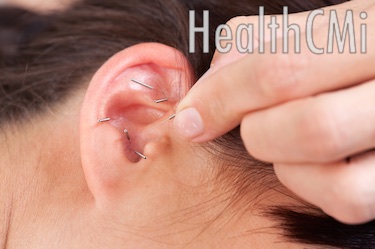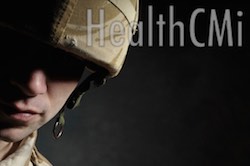Acupuncture effectively treats posttraumatic stress disorder (PTSD). Researchers conducting a randomized controlled study of active duty US military service personnel concludes that acupuncture significantly improves patient outcomes for PTSD patients. Acupuncture also induced secondary improvements: reduced depression and pain, improved mental and physical health functioning. 
The researchers note that there is underutilization of mental healthcare for PTSD patients. The research team notes that US military personnel have a 17% PTSD rate after combat deployment. However, research confirms that war veterans are reticent towards receiving medical care for PTSD.
The researchers note several examples of underutilization. An examination of Iraq and Afghanistan War veterans with PTSD, anxiety disorder or clinical depression finds that 81% acknowledge that they have mental health disorders. However, only 41% “reported interest in receiving help.” Only 30% sought professional help and 14% saw a mental health specialist. In addition, 25% of service members felt that mental healthcare does not work, 28% felt mental healthcare providers were untrustworthy and 41% felt that mental health treatment “would be embarrassing.”
A study of the general population reveals that only 7% of individuals with PTSD had initial contact with primary care treatment within the first year of illness. A national study reports that 59% of men and 26% of women “believed that PTSD treatment would not help.” The researchers note that acupuncture is “a safe, potentially nonstigmatizing treatment that reduces symptoms of anxiety, depression, and chronic pain….” They add that the underutilization of mental healthcare workers “suggests(s) that a novel and effective treatment option may help increase the proportion of those with PTSD who seek early treatment.” They note, “Acupuncture is a novel and therapeutic option that may help to improve population reach of PTSD treatment.”
The study concludes, “Acupuncture was effective for reducing PTSD symptoms.” The researchers determined that a brief course of acupuncture care “is an effective treatment adjunct for PTSD….” Patients using acupuncture combined with usual care “showed significantly greater improvements” over patients receiving usual care only. The researchers document, “The benefits associated with acupuncture were wide ranging and robust, yielding improvements in PTSD, depression, and pain severity of sufficient magnitude to benefit global mental and physical health functioning.”
The main goal of the study was to evaluate a short course of acupuncture care for military related PTSD. Patients in the study were active duty military members that were primarily recruited from clinics at the Walter Reed Army Medical Center. Other active duty patients included those from referrals. The study design was 8 acupuncture treatments over a 4 week period. Acupuncture in combination with usual care was compared with patients receiving usual care only without acupuncture. A 12 week follow-up documented significantly greater clinical improvements in the patients receiving the acupuncture combination therapy.
Acupuncture points were applied with filiform needles. Seirin brand J type needles of 0.14, 0.16, and 0.2 mm were used plus 0.2 mm L type needles. Acupuncture points used in the study included:
UB13, UB14, UB15, UB18m, UB20, UB23
LV3
LI4
HT5, HT7
PC6
KD3, KD9
CV4, CV15
GV24
Yintang
Auricular: Shenmen
Needle retention time was 15 - 30 minutes dependent upon the acupuncture point prescription.
In related research, acupuncture is found more effective than paroxetine (Aropax, Paxil, Sereupin) for relief of PTSD due to earthquake trauma. Researchers from the Chengdu University of Traditional Chinese Medicine and the Chengdu Military General Hospital conducted a randomized controlled clinical investigation of 138 patients with earthquake induced PTSD. Electroacupuncture was applied to the treatment group at GV20 (Baihui), Sishencong (Ex-HN 1), GV24 (Shenting) and GB20 (Fengchi). The medication group received oral administration of paroxetine. The medication group showed improvements. However, the reduction scores of PTSD including specific scores for anxiety and depression reduction were better in the electroacupuncture group than the paroxetine group. Based on this investigation, the researchers recommend further studies to measure the effects of electroacupuncture on PTSD patients.
Acupuncture for the treatment of concussions, insomnia, dizziness, headaches, and PTSD is used in the US military. Stars and Stripes published an article on this topic by Dr. Stuessi, a Navy sports medicine physician who works in a special concussion care center. He notes, “I’ve found phenomenal, off-the-charts results doing acupuncture for sleep, for dizziness and headaches.”
The US military has documented the usefulness of acupuncture since 1967 when an Army surgeon wrote an article on the efficaciousness of acupuncture in Military Medicine magazine. Since that time, doctors at the Walter Reed Army Medical Center in Washington recommend acupuncture for the treatment of physical pain due to injuries.
Col. Richard Niemtzow, an Air Force physician, first offered acupuncture in 1995 at McGuire Air Force Base (New Jersey). Later, he founded the Air Force acupuncture clinic at Andrews Air Force Base (Maryland). In addition to clinical care for patients, there is training for doctors to bring acupuncture therapy to war zones in Iraq and Afghanistan. The focus is on the treatment of pain and PTSD. 
The Navy has an acupuncture training program for doctors at Camp Pendleton (San Diego, California). Dr. Ronald White, as director of pain services at Landstuhl Regional Medical Center, commented on acupuncture, “There’s no risk; it gives you benefit. Our goal — my end result — is function. If you come to me complaining that you can’t play with your kids, you can’t sleep at night, you can’t work, and six months later, I have you playing, sleeping and back to work….”
References:
Engel, Charles C., Elizabeth H. Cordova, David M. Benedek, Xian Liu, Kristie L. Gore, Christine Goertz, Michael C. Freed, Cindy Crawford, Wayne B. Jonas, and Robert J. Ursano. "Randomized Effectiveness Trial of a Brief Course of Acupuncture for Posttraumatic Stress Disorder." Medical care 52 (2014): S57-S64.
Author Affiliations:
Deployment Health Clinical Center, Walter Reed National Military Medical Center.
Center for the Study of Traumatic Stress (CSTS).
Department of Psychiatry, Uniformed Services University of the Health Sciences, Bethesda, Maryland.
Palmer Center for Chiropractic Research, Davenport, Iowa.
Samueli Institute, Alexandria, Virginia.
Evidence-Based Complementary and Alternative MedicineVolume 2012 (2012), Article ID 431279, 7 pages. doi:10.1155/2012/431279. Clinical Studies on Treatment of Earthquake-Caused Posttraumatic Stress Disorder Using Electroacupuncture. Yu Wang, You-ping Hu, Wen-chun Wang, Ri-zhao Pang, and An-ren Zhang.
Author Affiliations:
Department of Rehabilitation, Chengdu Military General Hospital, No.270, Road Rongdu, Jinniu District, Chengdu, China.
Acupuncture and Tuina College, Chengdu University of Traditional Chinese Medicine, Chengdu, China.


